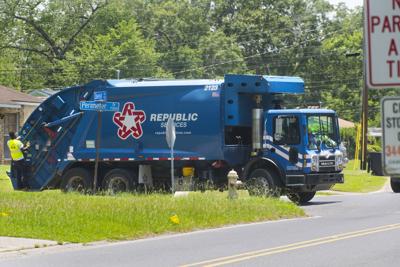Monthly bills for basic utilities like water and electricity should stay the same in the southeastern part of East Baton Rouge Parish if residents in the proposed St. George area vote next month to create a new municipality. It's too soon to tell whether costs will change for residential trash service or for sewage and drainage projects.
Voters will decide Oct. 12 whether to create a new 80,000-resident city in certain unincorporated parts of East Baton Rouge Parish. Early voting starts Sept. 28 and ends Oct. 5. If the incorporation effort is successful, St. George would become the parish's fifth municipality.Â
Organizers behind the effort to create a new city in southeast East Baton Rouge Parish on Thursday officially kicked off their campaign to con…
Darryl Gissel, the city-parish's chief administrative officer, expects little to change for the residents of the new city because water and electrical service will still be provided by Baton Rouge Water Co. and Entergy, respectively.Â
Representatives from the two companies said that much of the infrastructure used to provide service is already in place within the defined boundaries of the proposed St. George. Â
Editor's note: One in an occasional series of stories on the possible creation of a new city of St. George in the southeastern part of East Baton Rouge Parish.
There also won't be much of a change in costs associated with wastewater treatment for the residents, but when it comes to drainage, Gissel said, St. George proponents have made public statements recently suggesting they would handle drainage maintenance, so it isn't known, from the city-parish's standpoint, how much that might cost residents in the new municipality.
Drew Murrell, an attorney and spokesman for St. George proponents, says the proposed city would still reap the benefits of parishwide drainage projects, like the recently announced $200 million Flood Control Project.Â
"It's the parish saying they don't know how they're going to work with us," he said. Â
The U.S. Army Corps of Engineers said Thursday that a $255 million project to clear out East Baton Rouge’s waterways would improve drainage in…
And if there are upgrades needed to the infrastructure in the proposed city, or any expansions that must happen to the drainage and sewerage system in St. George when new subdivisions and businesses come online, the city-parish would pass those costs onto St. George since they wouldn't be covered by the existing user fees and dedicates taxes used to maintain the current systems parishwide.
The same would apply for expansions for other utilities as well, costs that are often passed on to developers in the parish's other municipalities, officials said.
The city-parish's sewerage system is currently maintained through a user fee, which generates about $90 million a year, and a half-cent sales tax that generates approximately $46 million, according to the city-parish's 2019 fiscal year budget.Â
The user fee residents pay, including those who live in the unincorporated areas, is based on consumption.
In their first-year budget plan, St. George organizers have set aside about $2.2 million for transportation and drainage out of the more than $58 million in annual sales tax revenue they've estimated they'll have if voters approve the incorporation.
"That wouldn't be our only funding source for drainage," Murrell said. "There would be federal and state money we would compete for to do projects, just like the city-parish does."Â
Gissel also couldn't say definitively if St. George residents would still pay $23 a month for residential trash service with the city-parish, which handles its garbage collection through a five-year agreement with Republic Services.
"If they don't do garbage collection with us, they'll have to negotiate their own arrangement," Gissel said. "Their story has been they would examine all the city services and if they liked them, they would keep certain ones and if they found something else, they would dump us."
St. George proponents have said they intend to model the proposed city after Central, the most recent city to incorporate in East Baton Rouge. That model consists of contracting the operation of a majority of its municipal services to private companies.
The petition that organizers circulated, drawing 14,500 signatures, states sanitation and garbage collection would be handled through the parish's "consolidated sewer district."Â
That district doesn't levy taxes because garbage collection is funded through user fees. It essentially serves as a mechanism by which services can be offered to unincorporated areas within the parish.
Spilled oil and garbage juice on city streets, missed collections and the inability to replace damaged garbage carts had Republic Services rep…
If the proposed St. George area becomes a municipality, said Angie Savoy, budget manager with the city-parish's Finance Department, St. George would no longer be a part of the district.
"However, since the city-parish operates under a home rule charter, this service may be negotiated," she said. Â
But Gissel added that the city-parish is under no obligation to do that. Â
"Each political entity is going to want to make sure they do what's best for their residents," Gissel said.
St. George is farther away from the city-parish's landfill than any other community in the parish. Right now, the city-parish averages the cost all residents pay for trash service, but if it finds it's more expensive to haul garbage across the parish for St. George residents, they may want to push those costs onto the proposed city.Â
"One group isn't going to want to subsidize costs for the other," he said.
The cities of Zachary and Baker have their own garbage contracts while the city-parish allowed Central to piggyback on the city-parish's contract with Republic.






